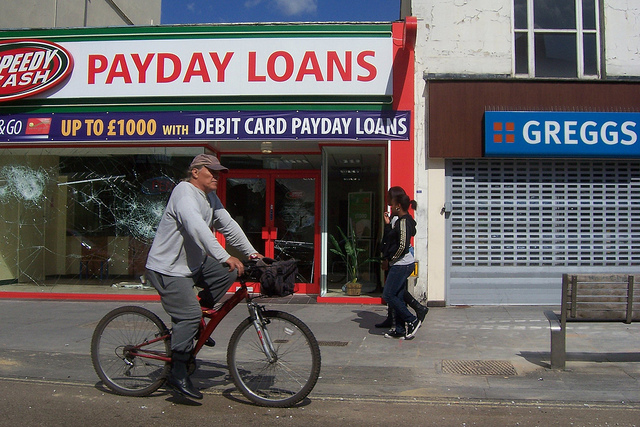
FFL Partners – Speedy Cash/ Rapid Cash
December 11, 2017
From report “Private equity piles into payday lending and other subprime consumer lending”
(Written jointly by Private Equity Stakeholder Project and Americans for Financial Reform)
In September 2008, San Francisco-based private equity manager FFL Partners acquired Curo Financial Technologies, which operates more than 400 locations in the US, Canada, and the UK.[i] In the US, Curo operates as Speedy Cash and Rapid Cash.[ii] Speedy Cash offers payday loans, installment loans, title loans, and line of credit loans through its branch network and online.[iii]
FFL Partners Co-Founder Chris Masto[iv] and Vice President Karen Winterhof[v] currently serve on the board of directors of Curo Financial Technologies.
Based on disclosures by the company, some customers who receive loans through Speedy Cash can end up paying as much as 729% interest annually (APR).[vi]
In late October 2008, California regulators issued a Desist and Refrain Order after finding that Speedy Cash collected excess bank fees of $106,614 from 5,291 customers in 9,150 transactions, collected $14,812 in excess of the loan agreements from 65 customers and collected non-sufficient fund fees of $1,385 from 76 customers in 80 transactions.[vii]
A 2013 analysis by ProPublica of lawsuits by payday lenders against customers in Missouri found that Speedy Cash, despite having just six locations statewide as of 2013, had filed more than 9,300 lawsuits between January 2009 and September 2013, more than twice as many as the next most litigious payday lender.[viii]
An April 2016 report from Northwestern University’s Medill News Service profiled Morris Cornley, a veteran residing in Kansas City who took out a $500 payday loan from Speedy Cash in Kansas City to keep from falling behind on bills.
“You see the commercials and the signs and it sounds easy to do,” Cornley said. “OK, $500 and you have 30 days to pay it back. What you don’t realize is you’re paying something every day.”
Cornley took out multiple payday loans from several lenders to cover his mounting debt.
“It got to the point where I couldn’t pay them,” Cornley said. “Then I found out Speedy Cash was trying to garnish my paychecks.”
Speedy Cash then went on to sue Cornley for his original loan, plus attorney and court fees. Gina Chiala, a Kansas City lawyer, took Cornley’s case pro-bono, and ultimately won.[ix]
[i]www.fflpartners.com/investments/curo-financial-technologies, accessed Jun 29, 2017.
[ii]https://curo.com/brands, accessed Aug 2, 2017.
[iii]https://www.speedycash.com/, accessed Sept 12, 2017.
[iv]http://www.fflpartners.com/our-team/chris-masto, accesed Sept 16, 2017.
[v]http://www.fflpartners.com/our-team/karen-winterhof, accessed Sept 16, 2017.
[vi]$150 single payment bi-weekly OCCC disclosure, www.speedycash.com, Aug 2, 2017.
[vii]Desist and Refrain Order, October 30, 2008.
[viii]“When Lenders Sue, Quick Cash Can Turn Into a Lifetime of Debt,” ProPublica, Dec 13, 2013.
[ix] “How short-term loans draw vulnerable borrowers into big long-term debt,” Medill News Service, Apr 9, 2016.
